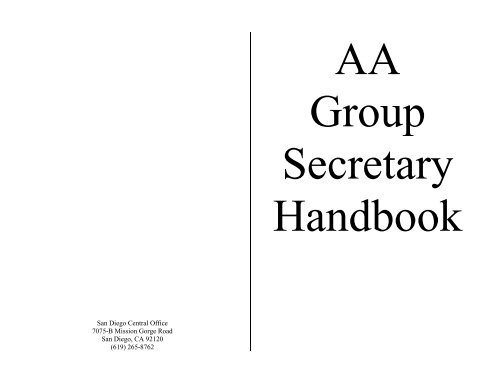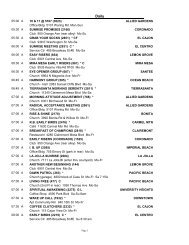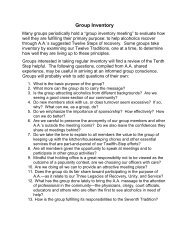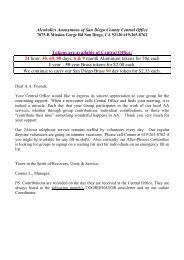AA Group Secretary Handbook - Alcoholics Anonymous San Diego ...
AA Group Secretary Handbook - Alcoholics Anonymous San Diego ...
AA Group Secretary Handbook - Alcoholics Anonymous San Diego ...
- No tags were found...
You also want an ePaper? Increase the reach of your titles
YUMPU automatically turns print PDFs into web optimized ePapers that Google loves.
<strong>AA</strong><strong>Group</strong><strong>Secretary</strong><strong>Handbook</strong><strong>San</strong> <strong>Diego</strong> Central Office7075-B Mission Gorge Road<strong>San</strong> <strong>Diego</strong>, CA 92120(619) 265-8762
Contents PagePage 1Page 2Page 2Dear <strong>Secretary</strong>What do <strong>Group</strong> Members Do?The <strong>Group</strong>What Trusted Servants are needed?Coffee MakerGreeterPage 3 <strong>Group</strong> <strong>Secretary</strong>Page 4 <strong>Group</strong> TreasurerPage 5 Literature PersonPage 5 “Conference-Approved Literature –What it means to you.”Page 6Coordinating Council (Definition and Purpose)Page 6 CoordinatorPage 7Area Assembly ( Purpose)Page 7 GSRGVRPage 8Page 9Page 10Steering Committee<strong>Group</strong> ConscienceAbout those group problems<strong>Group</strong> InventoryCentral Office is here to serve you.
Dear <strong>Secretary</strong>,Congratulations on being chosen <strong>Secretary</strong> of your group.Your service as <strong>Secretary</strong> is important, and others will look to you forleadership. Your efforts are part of the activities of thousands of otherswho are in action for the welfare of A.A. as a whole. If we at CentralOffice can help, please call.This handbook will provide answers to some of the questionsthat might arise. It is important that you and your group membersbecome familiar with A.A. Conference approved literature that helps tofulfill the needs of our growing fellowship. We suggest you announcethe availability of A.A. literature and display it for easy access.Literature may be purchased at Central Office-Monday thru Saturday,between 9:00 am and 5:00 pm.You will receive the “Coordinator” newsletter from CentralOffice to be shared with your group. Post it where members can read it.It contains personal stories, news items, reports and financialstatements. It is important that as much information as possible bedirected to as many members as possible. Information expands the<strong>Group</strong> Conscience, one of the strengths that hold A.A. together.Become knowledgeable about the different Service Committeesthat are the structure of <strong>Alcoholics</strong> <strong>Anonymous</strong> – Coordinating Council(Intergroup), the Area Assembly, Districts and Institutions Committee.Though sometimes called the “politics” of A.A., we think it is moreappropriate to recognize these committees as service opportunitieswithin A.A.Central Office depends upon the groups for the necessarysupport to carry out its responsibilities. This support comes in the formof volunteer help from group members and financial contributions. Allof us are reminded to “carry the message”, not just some of us. Ourefficiency and the continuation of services offered are related to thelevel of support from the groups.As <strong>Secretary</strong>, Central Office depends upon you to keep usinformed with current information about your group – changes inmeeting place or time and new <strong>Secretary</strong> or Coordinator information. Itis also important for your group to elect your group’s representatives tothe Intergroup (Coordinating Council) and Area Assembly.We started this with a reminder that your services as <strong>Secretary</strong>are important; let us end it with best wishes for your success and thecontinued success of your group.Sincerely, Central Office ManagerYour Central Office is here to Serve You.“A Central Office/Intergroup is an A.A. Service Office thatinvolves a partnership among groups in a community - just asA.A. groups themselves are partnerships of individuals. It isestablished to carry out certain functions common to allgroups.” GSO GuidelineWhat Does our Central Office Do?Receives an average of 3500 phone calls every month.Receives an average of 3000 website hits every month.Approximately 200 of those calls and emails are for 12 Step.There is always a need for members to sign up on our12 step phone and email lists.Central Office provides 50 daytime opportunities a weekto be of service answering phones.Almost 200 opportunities on the after-hours phones as a <strong>Group</strong>.Daytime positions as a bookstore volunteer.Central Office carries all <strong>AA</strong>WS (<strong>Alcoholics</strong> <strong>Anonymous</strong>World Services) conference approved literature.Print updated Meeting Schedules every quarter.Print our monthly newsletter, the Coordinator.Individuals or <strong>Group</strong>s can help fold and label each month.Provide information regarding other <strong>AA</strong> services.
GROUP INVENTORYMany groups periodically hold a “group inventory meeting” to evaluate howwell they are fulfilling their primary purpose: to help alcoholics recoverthrough A.A.’s suggested Twelve Steps of recovery. Some groups takeinventory by examining our Twelve Traditions, one at a time, to determinehow well they are living up to these principles.<strong>Group</strong>s interested in taking regular inventory will find a review of the TenthStep helpful. The following questions, compiled from A.A. shared experience,may be useful in arriving at an informed group conscience. <strong>Group</strong>s willprobably wish to add questions of their own:1. What is the basic purpose of the group?2. What more can the group do to carry the message?3. Is the group attracting alcoholics from different backgrounds? Are weseeing a good cross-section of our community?4. Do new members stick with us, or does turnover seem excessive? Ifso, why? What can we, as a group, do?5. Do we emphasize the importance of sponsorship? How effectively?How can we do better?6. Are we careful to preserve the anonymity of our group members andother A.A.’s outside the meeting rooms? Do we also leave theconfidences they share at meetings behind?7. Do we take the time to explain to all members the value to the groupof keeping up with the kitchen/housekeeping chores and otheressential services that are part-and-parcel of our Twelfth-Step efforts?8. Are all members given the opportunity to speak at meetings and toparticipate in other group activities?9. Mindful that holding office is a great responsibility not to be viewedas the outcome of a popularity contest, are we choosing our officerswith care?10. Are we doing all we can to provide an attractive meeting place?11. Does the group do its fair share toward participating in the purpose ofA.A.—as it relate to our Three Legacies of Recovery, Unity, andService?12. What has the group done lately to bring the A.A. message to theattention of professional in the community—the physicians, clergy,court officials, educators and others who are often the first to seealcoholics in need of help?13. How is the group fulfilling its responsibilities to the SeventhTradition?“The <strong>AA</strong> <strong>Group</strong>” pamphlet pgs 35-36Reprinted with permission from World Services, IncWHAT DO GROUP MEMBERS DO?“I am responsible… when anyone, anywhere reaches out for help, Iwant the hand of A.A. always to be there. And for that I amresponsible.” “Responsibility Declaration”When Newcomers walk into our meeting rooms, we want A.A. to bethere for them as it was for us—something we can do continuously onlyif we function as a group. But, for a group to keep going, all kinds oftasks need to be done.THE GROUP:Provides and maintains a meeting place.Schedules and holds meetings.Provides coffee.Carry’s the message of <strong>Alcoholics</strong> <strong>Anonymous</strong>.Adheres to the Twelve Traditions of <strong>Alcoholics</strong> <strong>Anonymous</strong>.Collects 7 th tradition and properly allocates and spends monies.Stocks <strong>AA</strong> literature and schedules.Answers calls for help.Discusses and resolves group problems.Sustains continuing contact with the rest of A.A.—locally,through the Intergroup (Coordinating Council)/ Central Office,<strong>Group</strong>’s District and Area Assembly; and Nationally throughthe General Service Office in New York.WHAT TRUSTED SERVANTS ARE NEEDED?Well, that depends on the needs and size of the meeting. Some of thefollowing are service positions common in our area.COFFEE MAKER: Most groups have a separate position for coffeemaker or the <strong>Secretary</strong> is responsible for making coffee.Start the Coffee pot early enough so that the coffee is ready 15minutes before the meeting is to start.GREETER: Welcomes everyone to meeting.
GROUP SECRETARY:It is suggested that a group <strong>Secretary</strong> have at least six months ofcontinuous sobriety; be free to attend meetings during the term ofoffice.Each group has its own procedures, however, the <strong>Secretary</strong> mayperform some, if not all, of the following:May be responsible for opening the meeting facility and settingup for the meeting.Start and close all meetings on schedule.Welcome newcomers and visitors.Arrange for a leader, and select members to read “How ItWorks”, “Traditions” and other group approved readings.Make A.A. related announcements, request monthly reportsfrom Treasurer, Coordinator and GSR representatives.Pass the 7 th Tradition baskets and manage the contributions inthe absence of a treasurer.Make sure the group’s information is current with the CentralOffice, Area Assembly and the General Service Office.Register as secretary with the Central Office as soon aspossible. You can call Central and have the volunteer fill outthe blue; “<strong>Group</strong> & Meeting Changes” form or use the meetingchange form on our website <strong>AA</strong><strong>San</strong><strong>Diego</strong>.org.Read the Coordinator newsletter and report to the group aboutA.A. activities and news.Advise the group of the needs at the Central Office, AreaAssembly, H&I and all other service needs.Maintain the group’s telephone list.STEERING COMMITTEE. Not all groups have SteeringCommittees. However, for those that do, the Steering Committee:Prepares slates of candidates for group offices.Hears questions relating to group practices.Insures that all issues are presented to the group conscience fordecisions and/or implementation.<strong>Group</strong> ConscienceWe hear the phrase “<strong>Group</strong> Conscience” often in A.A. This concept isfundamental and vital to the operation and functioning of <strong>AA</strong> at alllevels. It flows out of our 2 nd Tradition, “but one ultimate authority”.An issue is brought before the <strong>Group</strong>. Prior notice is given and thetopic under consideration announced. It is a practice in <strong>AA</strong> that we tryto have substantial unanimity, but we also listen to the minorityopinion. For small groups a committee of 4-5 members works well.For larger groups, 12 or more members provide a better cross section ofgroup experience.About those group problems…<strong>Group</strong> problems are often evidence of a healthy, desirable diversity ofopinion among the group members. They give us a chance, in thewords of Step Twelve, to “practice these principles in all our affairs.<strong>Group</strong> problems may include such common A.A. questions as: Whatshould the group do about “slippers”? How can we boost flaggingattendance at meetings? How can we get more people to help withgroup chores? What can we do about one member’s anonymity break?Another’s romantic emphasis on “thirteenth-stepping”? How can weget out from under the “bleeding deacons,” those old-timers who insistthey know what’s best for the group? And how can we get more of theold-timers to share their experience in resolving group dilemmas?Almost every group problem has a resolution, which usually can bereached through the mechanism of an informed group conscience.Importantly, a good sense of humor, cooling-off periods, patience,courtesy, willingness to listen and to wait—plus a sense of fairness andtrust in a “Power greater that ourselves”—have been found far moreeffective than legalistic arguments or personal accusations.These are just some of the basics your group needs to discuss.What are the group’s needs?What other positions may be needed?
AREA ASSEMBLYPurposeTo carry the message to the alcoholic who still suffers.To support the General Service Conference and its members inits role as provider of A.A. world services, and as guardian ofthe Twelve Steps and Traditions.To elect and support a delegate to the General ServiceConference.To provide communication and encourage unity within the area.To assist in the development and communication of aninformed group conscience.GSR: The group’s General Service Representative (GSR) works viathe District, Area Assembly and Area Committees. The GSR is thegroup’s link to the General Service Office (GSO) in New York and with<strong>AA</strong> as a whole. Call Central Office for your group’s district # anddistrict meeting time and location. In addition, GSR’s are the mailcontact with the GSO and receive the Bulletin, Box 459 and otherinformation from GSO to share with their group.Insures that the group and representatives are registered withthe General Service Office.Represents the group at district and area assemblies.Keeps the group informed of all general service activities in thearea.Receives and shares all mail from the GSO including thenewsletter (Box 4-5-9)GVR: The groups’ Grapevine Representative (GVR) throughawareness links the members of the group to the Grapevine monthlymagazine by bringing copies to the meeting and encouragingsubscriptions and submission of personal stories.GROUP TREASURER: This may also be the responsibility of the<strong>Secretary</strong> or a group might have a treasurer. The treasurer should befamiliar with the Seventh Tradition: Every group ought to be fully selfsupporting,declining outside contributions.Self-supporting means the contributions should cover: rent, literature,coffee and supplies. <strong>Group</strong> conscience may decide that the group alsopays for tokens and cakes for anniversary celebrations. After this selfsupportingminimum, it is suggested that monies equal to cover onemonth of all costs be kept as a “Prudent Reserve.” After operatingexpenses and prudent reserve are covered, groups generally distributeany surplus monies as contributions to support A.A. services.Keeps track of the group’s Seventh Tradition contributions andexpenses. (Forms are available at Central Office.)Knows how much money is required to meet the group’soperating needs and prudent reserve.Makes monthly or quarterly reports on income andexpenditures to the group depending on the group conscience.Informs the group of any shortfalls in monies to meet operatingexpenses or prudent reserve.Distributes the group’s surpluses to Central Office, AreaAssembly, <strong>Group</strong>’s District, H&I and GSO. You can find yourgroup’s Central Office Id #, <strong>Group</strong> Service # and District # onall receipts received from Central Office or you may callCentral Office for this information.(See the green “How and where to send contributions” insert.)
LITERATURE PERSON: This function may also be incorporatedinto the <strong>Secretary</strong> position. The literature person acquires andmaintains a stock of <strong>AA</strong> conference approved books and pamphlets.Also, meeting schedules, “Coordinator” newsletters and flyers for <strong>AA</strong>events.“CONFERENCE-APPROVED LITERATURE” – WHAT ITMEANS TO YOU.”“The term ‘Conference-approved’ describes written or audiovisualmaterial approved by the Conference for publication by G.S.O. Thisprocess assures that everything in such literature is in accord with A.A.principles. Conference-approved material always deals with therecovery program of <strong>Alcoholics</strong> <strong>Anonymous</strong> or with information aboutthe A.A. Fellowship.The term has no relation to material not published by G.S.O. It does notimply Conference disapproval of other material about A.A. Otherspublish a great deal of literature helpful to alcoholics, and A.A. does nottry to tell any individual member what he or she may or not read.Conference approval assures us that a piece of literature represents solidA.A. experience. Any conference-approved booklet or pamphlet goesthrough a lengthy and painstaking process, during which a variety ofA.A.’s from all over the United States and Canada read and expressopinions at every stage of production.Central offices, Intergroups and Area Assemblies do write anddistribute brochures or booklets that are not Conference-approved. Ifsuch pieces meet the needs of the local membership, they may belegitimately classified as “A.A. literature.”Excerpts from <strong>AA</strong> Service Piece #F29“Conference-Approved Literature” – What It Means To You.”Reprinted with permission of A.A. World Services, Inc.COORDINATING COUNCILDefinitionThe <strong>Alcoholics</strong> <strong>Anonymous</strong> <strong>Group</strong>s are the ultimate authority over allA.A. Councils, Committees and Service Boards. At our local level,representatives from the A.A. <strong>Group</strong>s make up the IntergroupAssociation known as the Coordinating Council. Each <strong>Group</strong> is entitledto elect a representative to the Coordinating Council. Each <strong>Group</strong> isentitled to one (1) vote on all matters brought before the Council. TheCoordinating Council and the Central Office are supported through thevolunteer efforts and financial contributions of the A.A. <strong>Group</strong>s theyserve. The Coordinating Council, in keeping with A.A. traditions,recognizes the autonomy of A.A. <strong>Group</strong>s in the area and does not claimto perform any governmental functions. The Coordinating Councilpledges cooperation with the North County Intergroup, <strong>San</strong> <strong>Diego</strong>Imperial Area Assembly, and all other A.A. service entities.PurposeThe Coordinating Council exists to aid the <strong>Group</strong>s in their commonpurpose of carrying the A.A. message to alcoholics. The CoordinatingCouncil oversees the Standing Committees as described in the Councilguidelines. The Council elects the members of these StandingCommittees from the Council membership or from the Fellowship atlarge. The Coordinating Council, through the Business Committee,oversees the Central Office, which performs services more easilyprovided by <strong>Group</strong> cooperation.COORDINATOR: (See “Being a Coordinator” pamphlet.)Attends Coordinating Council meetings.Reports on actions and plans of the Council to the group.Brings any group issues that effect A.A. as a whole to Council.Solicits and reports group conscience on issues before theCouncil.Any member of the fellowship is welcome to attend theCoordinating Council meeting.
TRADITION 4“Each group should be autonomous except in matters affecting othergroups or A.A. as a whole.”(Long Form)With respect to its own affairs, each A.A. group should be responsibleto no other authority than its own conscience. But when it plansconcern the welfare of neighboring groups also, those groups ought tobe consulted. And no group, regional committee or individual shouldever take any action that might greatly affect A.A. as a whole withoutconferring with the trustees of the General Service Board. On suchissues our common welfare is paramount.The 12 Traditions of A.A.1) Our common welfare should come first; personal recovery dependsupon A.A. unity.2) For our group purpose there is but one ultimate authority – a lovingGod as He may express himself in our group conscience. Our leadersare but trusted servants; they do not govern.3) The only requirement for A.A. membership is a desire to stopdrinking.4) Each group should be autonomous except in matters affecting A.A. asa whole.5) Each group has but one primary purpose – to carry its message to thealcoholic who still suffers.6) An A.A. group ought never endorse, finance, or lend the A.A. name toany related facility or outside enterprise, lest problems of moneyproperty or prestige divert us from our primary purpose.7) Every A.A. group ought to be fully self-supporting, declining outsidecontributions.8) <strong>Alcoholics</strong> <strong>Anonymous</strong> should remain forever nonprofessional, butour service centers may employ special workers.9) A.A., as such, ought never be organized; but we may create serviceboards or committees directly responsible to those they serve.10) <strong>Alcoholics</strong> <strong>Anonymous</strong> has no opinion on outside issues; hence, theA.A. name ought never be drawn into public controversy.11) Our public relations policy is based on attraction rather thanpromotion; we need always maintain personal anonymity at the levelof press, radio and films.12) Anonymity is the spiritual foundation of all our traditions everreminding us to place principles before personalities.Reprinted with permission of A.A. World Services, Inc.






